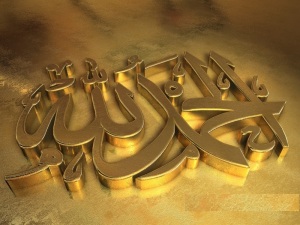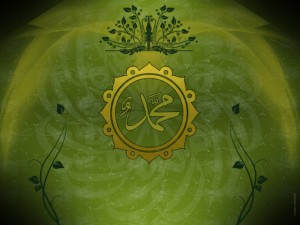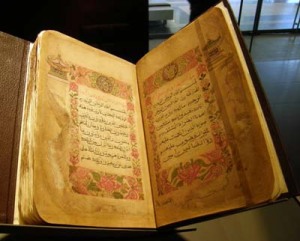
The Greatness of Allah
Nothing in this universe happens by coincidence but per some code of divine law. When a leaf falls from a tree, when there is a slightest movement on the earth, when a drop of ocean advances forward, they all seek the permission of Allah ﷻ. The warm and cold wind you see blowing has the command of Allah ﷻ behind it. Nothing happens by coincidence be it the health, sudden sickness, constraint in the rizq, happy and sad moments, honor and humiliation, facing prosperity in the morning and poverty in the evening, being healthy in the morning and getting sick in the evening and so on and on. Every single event in this world follows the code of divine law of Allah ﷻ. Allah ﷻ not just created this universe but runs all its affairs and everything happens only by His ﷻ command and there is nothing out of His control. He ﷻ is so powerful and dominating that only His command works. He ﷻ does as He ﷻ wills, when and where He ﷻ wills and He ﷻ cannot be stopped by anyone from carrying out His command. He ﷻ is the dominion of all. When He ﷻ destines something, there is no creature in the heavens and the earth that can stop it. He is the one and only King of both the heavens and the earth.
A ruler is the mirror of his nation’s deeds
Allah ﷻ has set the law like He ﷻ says, “If you remember me, I will remember you”. “If you take care of My laws, I will take care of you.” Allah ﷻ is explaining His ﷻ law here. “If you displease me, I will make your condition displeasing to you.” Once, Musa AS asked Allah ﷻ, “Ya Rabb! You are in the heavens and I am on the earth. How will I know if you are angry with me?” Allah ﷻ replied, “When My righteous slaves become your rulers and take care of your affairs, know that I am pleased with you. And when the worst and tyrant slaves take care of your affairs, know that I am angry with you.” The ruler of the nation is the mirror of the deeds of that nation. If you want to see people’s deeds, just look at their rulers, their care takers for you can estimate how much their deeds have fallen from righteousness. You can see your life in the mirror of the person in charge of you.
Be warned Oh Muslims!
Events upon events are coming along your way with troubles and worries on one side and your honor is in danger on the other side. This is a notice from Allah ﷻ that His ﷻ mercy is turning away from you and the Rabb is depriving you of His help. Nothing is coincidence. A hadith says when Allah ﷻ wishes good for a nation; He ﷻ grants them a righteous ruler and will give the wealth to the most generous of them. And if He ﷻ wishes evil for the nation, then the rule goes in the hands of foolish and the wealth to the misers. Whatever happens is the work of Allah ﷻ and only His ﷻ is the rule. Hazrat Fuzail bin Ayaz (RA) relates that Allah ﷻ sent wahi (revelation) to some Prophets (AS), “When people who recognize Me and believe in Me start disobeying Me, I will so punish that I will subject them to such tyrant rulers who do not even know me.” Allah ﷻ has an established rule on which this world runs. It is very certain that if we touch the ember, it will burn our hand and if we hold the ice cube, our hands will get cold. There is always a cause and reason. Similarly when there is disobedience of Allah ﷻ, there will be an effect. When the shameful acts become a norm, there will be rise in calamities. The killing of people by bomb blasts or people killed in bus accidents or any news we hear doesn’t happen just like that. When Allah’s mercy turns away from us, we will start getting news of destruction from all the directions.
Evil upon evil
Once Prophet ﷺ told about the causes that when such and such acts become prevalent in the society, then the calamities will break down from Allah ﷻ just like how a chain of beads gets cut off. The destruction will befall the society and the countries just like the beads. This will happen when people will misuse the public money for personal reasons, they will keep hands on others money as if their own and spend as they wish, the zakaat will be felt as a tax or burden, the wife will be obeyed and the mother abandoned, the friends will be loved and taken as well wishers and the fathers will be hated and considered as enemies. Which of these doesn’t happen in our society? The conditions do not become worst as such. When the societies turn filthy with filthy sins, when music is heard from houses and when roads and markets are filled with animated pictures, Allah ﷻ turns away His mercy from that society. When haram income enters homes and when people start taking pride in usury, Rabb turns away His mercy. When filthiness and taking interest becomes rampant in a society, Allah ﷻ destines destruction for them. Our beloved Prophet ﷺ clearly mentioned the causes for the destruction that if we do such and such acts; we will face such and such destruction. If our life has still the same face, our condition will worsen more. The hadith continues about voices being raised in masajid, that is when people will lose the azmat of Allah ﷻ. We hear the scary news about death of many people in an accident but how many of us have purified our houses from music, sins and how many of us have shed the tears regretting and repenting for the sins? Definitely the condition will become worse day by day. When the music is heard everywhere, men and women work together in offices, markets and factories, how will Allah’s ﷻ mercy turn towards us?
The excellence of having azmat of Allah ﷻ
When the whole society is guilty of sins, oppressors upon oppressors will become dominant. There won’t be any hope of goodness. Allah ﷻ will screen one’s heart and he will elect the same individual, whose principle will become his and he will become his guide and leader. From every direction there is only state of fear. Neither one’s life is secured nor his wealth and honor but no one is ready to remove sins from their lives and protect himself. Our beloved Prophet ﷺ told us to protect our wealth by paying zakaat and we are asked to embrace taqwa, so Allah ﷻ brings us out of every calamity. wamay yattaqillaha yaj’Aal lahu min amrihi yusraa.And for those who fear Allah, He will make their path easy. Remove all the disobedience of Allah ﷻ from your life, Allah ﷻ will ease your way. The Prophet ﷺ continued that people will consume more alcohol. The new generation has such a great pleasure in intoxicants. There are many habits of intoxication like cigarette, the masticator made of the betel leaf and so many other things and the worst addiction is of alcohol which is very difficult to give up. Having alcohol was so deeply ingrained in the Arabs that in Arabic language, there were about 200 names just for alcohol. If it is consumed in the morning, it has a different name, if drunk in the evening it has a different name, if it is mixed with water, it has a different name and if mixed with something else has a different name and has about 200 names. When a child becomes adult, the first thing he was taught was to drink alcohol. But the Prophet ﷺ so put the fikr of akhirat and azmat of Allah ﷻ in the hearts of Muslims that when it was announced that alcohol has been made haram, the pots of alcohol got broken, the glass of alcohol which was taken to the mouth was thrown away and the alcohol was flowing in the streets of madinah like the rain water and they didn’t dare to consume alcohol again.
Have the courage
O honorable ones! When you have courage, you can give up any sin. I swear on Allah ﷻ if you do not have the strength to give up sins, Allah ﷻ wouldn’t have commanded to give up sins. We have lost the courage. During the time of Khalifa Harun Rashid, a man came to his court to show his skill so he can get some prize. The man pinned the needle on the ground and from a distance, he threw the thread that came out of the needle’s eye. He would have practiced with great efforts as it is not an easy thing. Khalifa Harun Rasheed was very amazed and told him that he has never seen such a skill and ordered to give him ten gold coins and also to hit his head with shoes ten times. The man said he can understand about gold coins but why the beatings. Khalifa replied that indeed you had a great skill for which I gave you ten gold coins and as far as the beating had you worked hard for something else, you would have benefitted in both the worlds. The truth is when man takes courage he can do very strange things. He has made way out of air, sea, mountains and Allah ﷻ has placed so many abilities in him and the only thing he needs is courage. It is only the lack of courage that one finds it impossible to give up sins and if he takes courage his house would be purified from sins.
The wretched state of men and women
The Prophet ﷺ told that the most wretched and malicious person will become the leader of the nation. The woman will imitate the man and the man will imitate the woman. It is getting difficult to differentiate a woman from the man. Her dress is getting tighter and tighter. Even the man is not allowed to wear tight clothes that will show the shape of his body and unfortunately today the woman has started wearing it. Our beloved Prophet ﷺ told once that a time will come when a woman will wear dress but still be naked. Such a scenario couldn’t be imagined during the Prophet’s ﷺ time but a Prophet ﷺ looks through the eyes of nubuwwat. Women wear very light and tight dresses that her body gets revealed through it. Such a woman will be filthy on her own and she will turn others attention towards her filthiness and her hair will be tied like a lump on her head. She will be deprived of even the scent of jannah when it will reach miles and miles. O the honorable ones! The worst condition of our houses, society and country didn’t happen by coincidence but there is a divine rule behind it. What you sow, you reap. The man is wearing earrings and bangles in his hands that one gets confused if he is a man or a woman. People will consume usury. How is it possible that you adopt the trade of usury and you also want peace? Can anyone live peacefully waging war against Allah ﷻ? If you do not give up usury, then come to the battlefield to fight against Allah ﷻ. You are very daring to proclaim war against Allah ﷻ. When Allah ﷻ proclaims war against anyone, how can he be saved from destruction?
Two things which will save this ummah
O honorable ones! Do not look just at the worldly causes that lead to the destruction but look at those mentioned by Allah’s ﷻ Prophet ﷺ. The hadith says that the later generation of this Muslim ummah will speak badly of the earlier generations. Today the honor and respect of the Companions is not saved and the honor and respect of even the Prophets (AS) are not saved. Whatever one wishes he blabbers and writes down and there is none to question him. Our beloved Prophet ﷺ said when our state reaches to this worst level, then the signs of Allah ﷻ will manifest and lashes upon lashes will shower from Allah ﷻ that we will know only the worst from east, west and from every single place. Our beloved Prophet ﷺ said as long as there are two things in my ummah, they will be protected. One is the presence of Prophet ﷺ that is as long as he ﷺ is alive calamities will not befall Muslims and the second thing is as long as people keep seeking Allah’s ﷻ forgiveness, the calamities will not befall. Committing sins by itself is bad and taking pride in sins is worst as you are openly proclaiming your enmity. If you give a torn currency note to the bank, you might be replaced with a new note and what will happen if you tear the note in front of the bank officer? Will he give you a new one? No but he will register a case against you. Feeling guilty before court is something and standing with pride is dishonoring the court.
Committing sins openly and our crying
Today sins are not committed in secret but an open invitation is made and proclaimed. Our Prophet ﷺ told his ﷺ ummat will be forgiven for sins done in secrecy but if done in open then one will be away from Allah’s mercy and forgiveness. Well you lead a sinful life but now regret and turn to Allah ﷻ in repentance. When we see all the causes for our destruction as mentioned by our beloved Prophet ﷺ in our houses, marriage ceremonies, deaths, markets and in the whole of our society, what right do we have to say there is only ruin? You adopt all the means of your destruction and then you shout you are getting destroyed. This is like one is having dysentery and instead of taking medicine to stop that, he is taking medicine to stimulate it more and he keeps crying that he got dysentery. Won’t one think him as mad who lost the sense? Neither he is ready to give up lying nor usury, remove filth from his home or to offer fajr salah. He won’t give up anything but he will keep crying about his condition.
The three great blessings of seeking forgiveness
Allah ﷻ won’t snatch away the bounties or blessings from the bounties from His ﷻ slave until he misuses those blessings to disobey Him ﷻ. We definitely need protection and our beloved Prophet ﷺ has asked us to make the habit of seeking forgiveness. Regret on your sinful life. In fact Prophet ﷺ said that the one who seeks forgiveness will get three great blessings right in this world. Know that istighfaar (seeking forgiveness) is not merely to do with the words but there should be regret in the heart. The first blessing of istighfaar is Allah ﷻ will remove us from every single difficulty; the second blessing is Allah ﷻ will pave way to get out of our grief and the third blessing is Allah ﷻ will so open the doors of provisions that we would have never ever imagined. This was said by the most truthful Prophet ﷺ of Allah ﷻ. Are we not worried about the affairs of our family, our children, business, the security of our honor and life? Now how easily we got the tip to achieve peace and that too from the Prophet ﷺ of Allah ﷻ who says only what Allah ﷻ inspires him ﷺ. And know that when Allah ﷻ says something, His ﷻ qudrat (power) is behind Him ﷻ. There is no deficiency in the treasure of Allah ﷻ and even today there is peace, tranquility, provisions, love in between family members and everything in His ﷻ treasure.
He ﷻ has the treasure of both the worlds and it is only we who failed to receive it from Him ﷻ. We do not know the way to get the treasure when there is no deficiency in Allah’s ﷻ treasure. It is we who have closed the doors of Allah’s ﷻ mercy. Our behavior has turned away Allah’s ﷻ mercy. Nothing happens coincidentally but as per the divine law of Allah ﷻ. I wish all our men, women, the rich and the poor come to the terms of istighfaar when we will get the peace for this is the way of peace. If you want to feel secured, do more istighfaar. Once the Companions asked the Prophet ﷺ if Allah ﷻ would send the calamities even on the righteous people. The Prophet ﷺ replied, “Yes when the sinners exceed in number, then Allah ﷻ will send down punishment to all the people but as far as the righteous people are concerned, Allah ﷻ would recompense them in the akhirat.”
Have courage and continuously seek Allah’s ﷻ help
If a big assembly of people seeks forgiveness of Allah ﷻ, there is a possibility that Allah’s ﷻ anger would quench and His ﷻ mercy would turn towards us. Two things are needed, the courage and turning towards Allah ﷻ. Use whatever courage you have to purify from sins. Keep seeking Allah’s help and make earnest duaa like, “O Allah! I am very weak and I always fail before my nafs and shaitaan. Help me O Allah! Iyyaka nabudu wa iyyaka nasta’een.Ya Allah! I claim to worship only You but without Your help nothing can be done. If You help me, I will be able to worship You and if You do not help me, I will be helpless. He ﷻ is very beneficent and if anyone turns towards Him, then His mercy will turn towards him zealously and He ﷻ will take care of him. The toddler keeps struggling and keeps falling often but with great courage, he tries to reach his mom and a time comes, when the mother advances by herself and takes him on her lap. Even if we try to reach Allah ﷻ with true determination falling often, inshaaAllah Allah’s ﷻ mercy will embrace us and take care of us. Proceed towards Allah ﷻ with great courage.
O honorable ones! Everyone is worried and restless with trials and tribulations. For Allah’s ﷻ sake adopt the tip for peace given by the Prophet ﷺ. Don’t waste time in reading news reports because we will get more worried from what we see and read. Just do what the Prophet ﷺ told us to do. Turn towards righteous deeds. The Companions said about the Prophet ﷺ that whenever a slightest change is seen in the environment like when wind blows fierce fully or when there is severe rainfall, he ﷺ used to run immediately to Masjid and turn to Allah ﷻ and get stuck to the doorstep of Allah ﷻ. This is the glory of a believer that whenever his condition troubles him, he gets close to Allah ﷻ and his condition in turn will become a rahmat (mercy) for him. If we embrace such a life, then there is a hope that Allah ﷻ would make our condition better, make our path easy and bring us out of every single difficulty. Let Allah ﷻ help us all to act on what we hear, write and read. Ameen




















